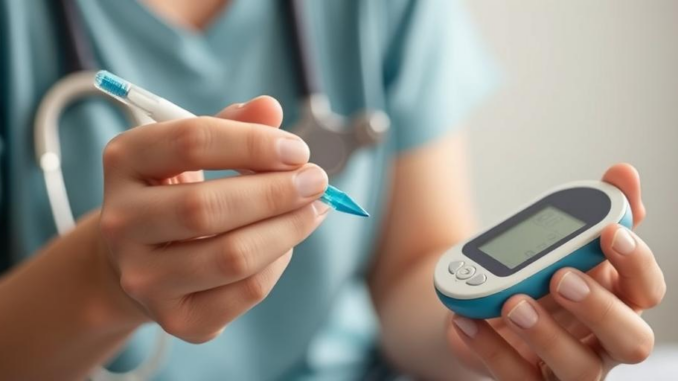
Summary
A groundbreaking new tool accurately predicts the most effective treatment for individuals with type 2 diabetes, potentially transforming diabetes care worldwide. This tool analyzes patient data to match them with the most suitable glucose-lowering drug, leading to significant improvements in blood sugar control and reducing the risk of complications. This personalized approach promises a brighter future for millions living with type 2 diabetes.
** Main Story**
A New Era of Personalized Diabetes Care
Exciting news out of the University of Exeter! Researchers there have developed a tool that could really shake up how we treat type 2 diabetes. Imagine a future where instead of a one-size-fits-all approach, doctors can predict which glucose-lowering drug will work best for you, specifically. That’s the potential of this new innovation.
This tool works by analyzing a bunch of patient data. We’re talking age, sex, blood sugar levels, BMI, kidney and liver function, cholesterol – the whole shebang. From there, it spits out a recommendation for the most effective medication. It’s a move towards truly personalized medicine, and I’m here for it.
The Blood Sugar Balancing Act
Now, let’s be real; managing blood sugar levels is a tough gig for a lot of people with type 2 diabetes. I mean, even with all the drugs available, only about a third of people are hitting their target levels. It’s frustrating, right? But why is that?
The simple answer is that what works for one person might not work for another. And up until now, we haven’t had a good way to predict which drug would be the best fit. It’s been a lot of trial and error, which isn’t ideal for anyone, especially the patient involved.
How Does This Predictive Power Work, Then?
This tool tackles that problem head-on. It’s designed to predict the most effective drug for each individual, as I said earlier, and it was built on a massive dataset from over a million people with type 2 diabetes in the UK. I mean, that is a lot of data. Researchers linked GP and hospital records to get a complete picture of patient outcomes, and then they double-checked the tool’s accuracy with clinical trial data. Pretty thorough, if you ask me.
Essentially, it uses routinely collected clinical information to point doctors toward the most suitable glucose-lowering drug. Simple and effective.
Transforming Diabetes Care; The Impact
This research is really promising. Studies are showing that only 18% of people with type 2 diabetes are actually on the most effective medication for them. I know, mind-blowing, right? But by using this tool, blood sugar levels (HbA1c) could be reduced by, on average, 5mmol/mol after just a year.
Think about it. This kind of improvement can delay the need for more medication and reduce the risk of serious long-term complications like heart attacks, strokes, and kidney disease. And, because the tool is relatively simple and inexpensive, it could be accessible worldwide. That’s potentially a game-changer for millions.
I think it’s important to remember that, as crucial as medication is, a holistic approach is really the key to managing type 2 diabetes effectively.
Lifestyle changes—healthy eating, regular exercise, weight management—these are fundamental. They work with medication to improve blood sugar control, lower the risk of complications, and boost your overall well-being. I remember one time, a friend of mine lost just a small amount of weight, and it had a noticeable impact on their blood sugar.
So, what kind of lifestyle changes, you might ask?
- Weight Loss: Even a little bit can make a big difference.
- Regular Exercise: Improves insulin sensitivity and helps with weight management.
- Balanced Diet: Think fruits, vegetables, and whole grains. Gotta control those calories too.
A Brighter Future for Diabetes Management
This new tool is a major step forward, I’m sure you agree. By predicting the best treatment for each patient, it helps doctors create better treatment plans and improve patient outcomes. Add in those important lifestyle changes, and you’ve got a brighter future for people living with type 2 diabetes. Less burden, better quality of life – that’s the goal, isn’t it?
Right now, the tool is mainly used for research, but hopefully it’ll be available for clinical use soon. Imagine the impact when personalized medicine becomes a reality for millions worldwide! I, for one, am keen to see it happen.


The potential for reducing long-term complications through personalized medication plans is significant. Beyond medication, what are the key behavioral interventions that can be integrated to enhance the effectiveness of this tool and promote better patient outcomes?
That’s a great point! Absolutely, behavioral interventions are crucial. Things like diabetes self-management education, stress reduction techniques, and even support groups can significantly enhance the tool’s impact and improve overall patient well-being. Combining personalized medication with personalized lifestyle support is the ultimate goal!
Editor: MedTechNews.Uk
Thank you to our Sponsor Esdebe
A tool that predicts the *best* drug? Does it also predict which donut I should eat for optimal happiness? Asking for a friend… with type 2 diabetes and a sweet tooth. Is there an algorithm for that too?